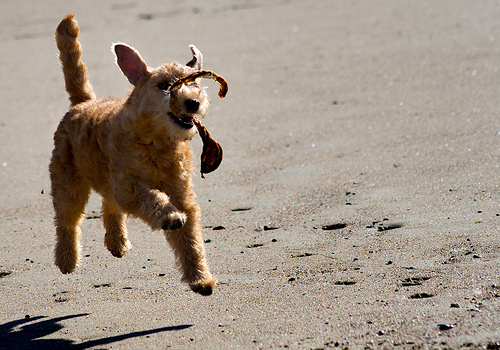Trying to determine if your dog is experiencing anger, love, or any other “human” emotion is difficult. To date, no one has been able to provide convincing scientific evidence that we can distinguish one emotion from another by what our brains or hormones do. We obviously feel differently when we’re in a loving versus an angry mood; however, what our brain does to influence us to feel those very different emotions is less clear.

Nonetheless, we believe that our pets love us, they appear to be embarrassed when we dress them up in silly clothes, and they certainly look like they’re feeling guilty after doing something wrong.” But do they know right from wrong, and when they do the wrong thing, do they really feel guilty?
What would it take for us to be convinced that our pet actually experiences a specific emotion? Is it possible that his appearance, the way he looks in his body language and behaviour, leads us to confuse guilt with submissive, defensive behaviour? Do we think that he’s experiencing guilt from the way he looks or from the situation that seems to call for guilt? Do we think that our dog actually feels emotions such as guilt, love, shame, hope, pride, relief, regret, or revenge? It’s an interesting question, and behaviourists are still working on it. But let’s look at it in terms of revenge.
When we think of getting revenge against someone who has “done us wrong,” we think of doing something to get back at the person. We decide on the appropriate revenge by imagining how it would make the person feel to have such-and-such happen to him. If we think it would really make him feel bad, and it would get back at him in an appropriate way, it makes us feel good, even if we just imagine it. We don’t actually need to get revenge, we just need to imagine his reaction if he were to get what he deserves.
Your dog probably doesn’t have the ability to imagine how you would feel if he were to soil your bed as revenge for leaving him alone all weekend. And he probably wouldn’t chew your favourite shoes as revenge for locking him in the bedroom and keeping him from enjoying that piece of chicken you had last night. The ability to look into another’s psyche to imagine one’s emotional response to a planned endeavour is what behaviourists call revenge. Revenge requires a “theory of mind” that dogs do not have.
Dogs see the world from their perspective. That’s why arranging their daily lives from their point of view works so well. Not only would it seem strange to understand why you won’t give him a dog biscuit before dinner because it would spoil his appetite, but it would seem even more strange if he is seen planning something later that evening to make you feel bad in some way for your stinginess. Yet we often find ourselves believing that this is exactly what our pet must have done when we discover that he’s chewed our best shoes. In reality, our pet’s behaviour is probably caused by a disruption of his routine, an increased arousal or excitement, or a way to relieve discomfort or frustration.
Now that you understand your dog’s emotions, you can go about changing them to create a mood that is incompatible with the mood that drives his misbehaviour. The concept is called the principle of competing motivations: A dog cannot be angry, fearful, or depressed and happy or exited at the same time!
Enter your email and never miss out on receiving our best articles:








2 comments
I think the bigger one is not a real dog, it’ s a stuffed one…
dog on the right is not a real dog yet the other dog is showing it affection as if it is another dog